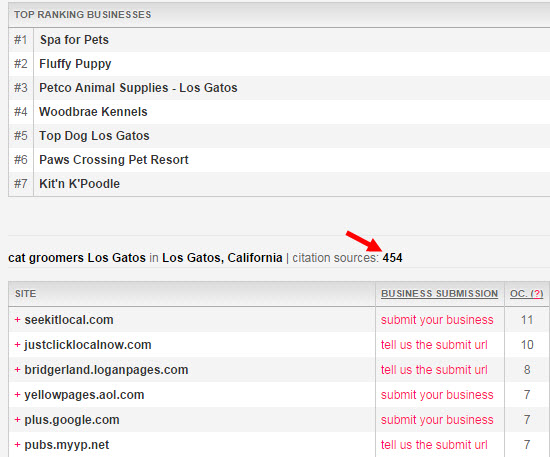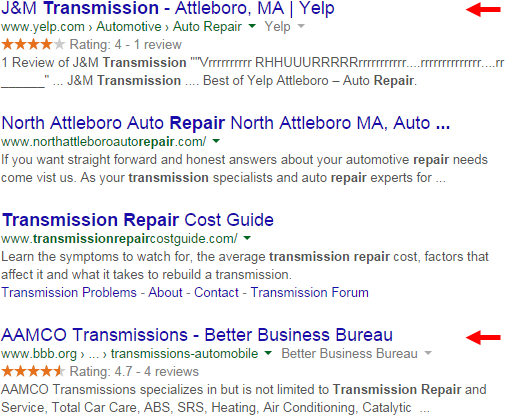Image may be NSFW.
Clik here to view.
People often ask me what kinds of competitive fact-finding I think can help their local SEO efforts. My answer usually is, “Not what you’d think.”
The theory is solid enough: you want to know why your competitors outrank you in the local results, so you try to find out everything you can about them. Knowledge is power, right?
But there are some problems inherent in competitive-intelligence:
- You’ll be tempted to do whatever your competitors do, even if it’s stupid and might earn them a penalty in the future. Lemmings off a cliff.
- You won’t know exactly why they’re ranking well now.
- You may not know how long they’ve ranked well (for all you know, there’s a bug), and you can’t know how long it will last.
- It’s hard to know to what extent your competitors’ search-engine visibility results in paying customers.
- Google can see things that you can’t.
Image may be NSFW.
Clik here to view.
You don’t want to be the schmuck who says, “I don’t get it…I’m doing everything my competitors are doing, so why don’t I have good rankings?” Well, because Google may not be looking for more of the same in the search results – and your would-be customers certainly aren’t.
The best thing you can do is gather the kind of competitive-intel that you can use to get ahead of your competitors, and to ignore the useless facts that only allow you to ape them.
Let’s start with the useless stuff that – in my opinion – isn’t even worth researching:
Useless competitve-intel
- Keyword-density. Because you too can be the proud owner of a spammy site that confuses and annoys visitors.
- Anchor text of inbound links. If you can control the anchor text it’s probably not a good link in the first place. But in either case, the temptation to go too far is too strong.
Image may be NSFW.
Clik here to view.
- Title tags. Most people (especially SEOs) write horrid title tags. Ignore them and just write a good one.
- Domain name. Yes, a keyword-relevant domain is a small advantage. But changing your name is a big deal, and not worth the hassle purely from a rankings standpoint.
- Domain age. Same issues as with domain names, except an old domain that you buy is an even smaller advantage, and you may inherit some backlinks baggage.
- Name of Google Places landing page. In my experience, you’re more likely to rank well if you use your homepage. But there are exceptions. If you see a competitor who’s using a city-specific landing page he / she may be one of the exceptions. Your mileage may vary.
- Google Places description. Your competitors probably don’t rank for every keyword in their descriptions. Most likely neither will you.
Sometimes-useful intel
- Inbound links. (C’mon, you know the pros and cons of looking at competitors’ links.)
- Site structure. Your competitors’ pages may be easier for Google to crawl, and there may be more of them that conceivably could rank well.
- Title tags. Most people (especially SEOs) write horrid title tags. Ignore them and just write a good one – OR, if you must look at someone else’s title tag, do it just to get the creative juices flowing. (Thanks to Dave for reminding me in his comment that this sometimes has value.)
- Citation sources. You also need to know which ones matter.
Image may be NSFW.
Clik here to view.
- General online activity and mentions – the kind of stuff you can monitor with IFTT, Mention.com, or Google Alerts.
My favorite intel
- What useful pages do your competitors have that you don’t?
- Where do they have reviews?
- How many reviewers do they have? It’s worth knowing whether your competitors have had many customers / clients / patients to review them, or they’re banking off one or a few super-fans
- How many of their other locations rank well? You might want to pay closer attention to a company that’s 5 for 6 than one that’s 1 for 6.
- What categories do they use on their Google Places page and on other listings?
Image may be NSFW.
Clik here to view.
- What kinds of barnacle SEO advantages do they have?
Image may be NSFW.
Clik here to view.
- Are they in blatant violation of any of the Google Places Quality Guidelines?
- What obvious mistakes are they making? (And how can you avoid making those mistakes?)
Pay attention only to the areas where you can do something beyond just ape what other people are doing. Especially in the long term, that’s the only way you can use competitive-intel to pull ahead, rather than to be just another plastic-coated noggin in the peloton.
Image may be NSFW.
Clik here to view.
—
What’s your philosophy on researching local competitors? What do you pay attention to or ignore? Leave a comment!
